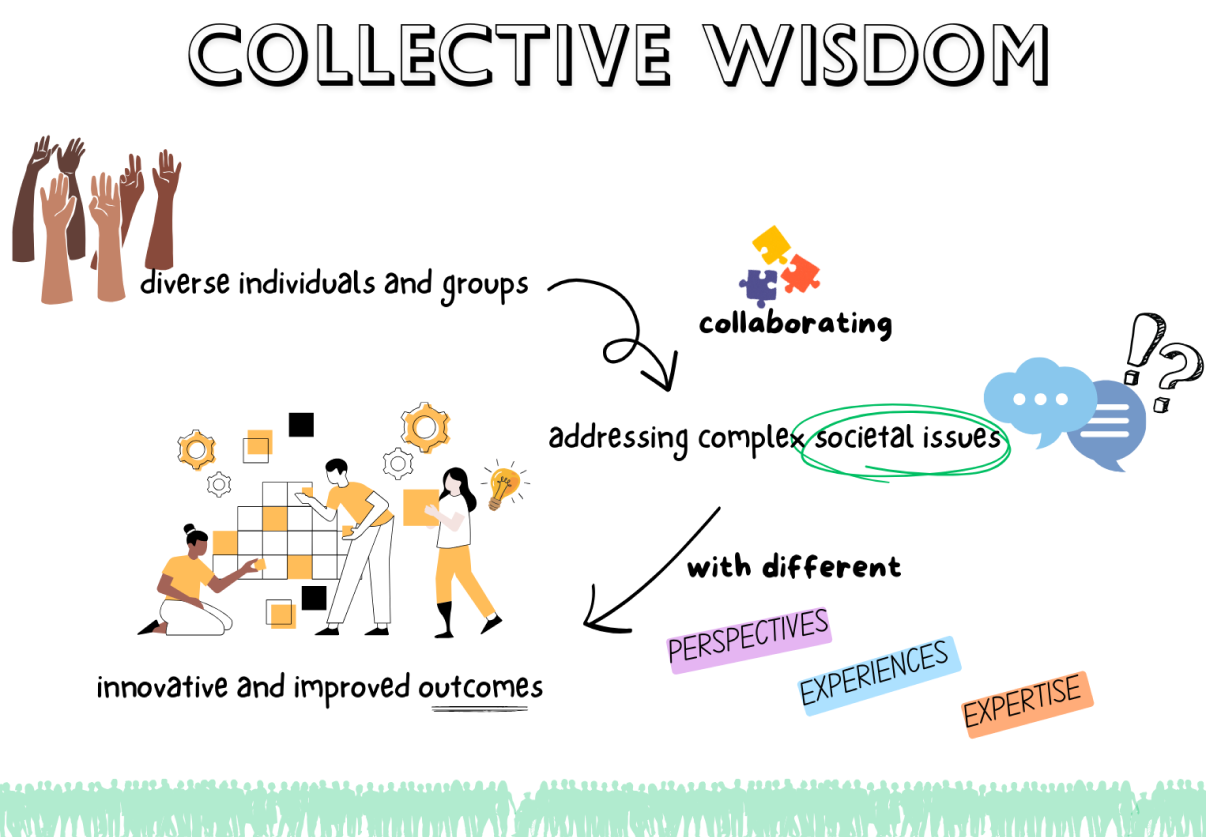BY @ANAGA SIVARAMAKRISHNAN | 3 MIN READ | PUBLISHED ON 16.11.2023
Perceiving Collective Wisdom
The first time I heard the phrase ‘Emergence of Collective Wisdom with Apurva.ai’, I visualised it as a multi-way bridge. The bridge connects diverse individuals of different backgrounds and regions. It fills up gaps and breaks barriers of access. It offers multiple routes of perspectives that are continuously exchanged and they meet in between, indicating the convergence of these perspectives. Its strong foundation lies in people’s experience, insights and expertise. It is better sustained by larger groups of individuals as supportive pillars. This is how I visualise the emergence of collective wisdom with Apurva.ai, where it allows inclusive and holistic approaches to decision making and problem solving.
The term collective wisdom has had a long journey and has been perceived differently over the years. Our understanding of the term is based on these perspectives.
Collective wisdom can be traced all the way back to Aristotle and his quote “Many heads are better than one” where the great thinker highlights the significance of wisdom unfolding from multiple perspectives, even a group of laypeople, over a single expert 3 .
Francis Galton observed in a fair how the median and mean of laypeople’s guesses on the weight of an ox came closer to the actual weight. Galton concludes that the collective judgement is generally smarter than any individual judgement 2 .
This is further elaborated by James Surowiecki in his book titled ‘The Wisdom of Crowds: Why the Many Are Smarter Than the Few and How Collective Wisdom Shapes Business, Economies, Societies and Nations’ (2004). Surowiecki claims that collective wisdom is a result of millions of people contributing their insights and experiences where direct deliberation isn't part of the process 1 .
Surowiecki emphasises on four concepts for the emergence of collective wisdom1.
(i) diversity in rationality of individuals
(ii) independent thinking of individuals
(iii) decentralised systems across levels to include individuals and local groups closer to the ground to
provide problem-specific knowledge
(iv) aggregation of locally acquired knowledge across the world
Over the years, the definition and features of attributing collective wisdom has been shaped by various thinkers and scholars. The scholars have emphasised that collective wisdom emerging is more intelligent with bigger groups as they have reduced influence on each other, more prone to discuss conflicts openly and average of error diminishes with more number of insights. Groups are more intelligent if there are high levels of trust and low levels of hierarchy structures 2 & 4.
At Apurva.ai, we define collective wisdom as the collaboration of individuals or groups from different segments of society to solve a complex systems problem. Each group brings their unique perspectives, experiences and expertise towards the problem. When these diverse perspectives are combined, we gain a comprehensive understanding of the broader system that cannot be achieved alone. It signifies the collective understanding and decision-making capacity of the entire group. The compounding effect of blocks of intelligence leads to the emergence of collective wisdom.

As Helen Keller once said, "Alone we can do so little; together we can do so much." So, how do you perceive collective wisdom?
References
- Arima, Y. (2022). Psychology of Group and Collective Intelligence. Springer. https://link.springer.com/charpte/10.1007/978-3-030-84698-5_5.
- Hypermind. (2021). The Wisdom of Crowds: the science of getting smarter together [Video]. Youtube. https://www.youtube.com/watch?v=HNQ3GccCAI0.
- Landemore, H. (2012). Collective Wisdom: Old and New. In Hélène Landemore & Jon Elster (Eds.), Collective Wisdom: Principles and Mechanisms (pp 1-20). Cambridge University Press.
- Productivity Guy. (2020). The Wisdom Of Crowds | By James Surowiecki (Animated) [Video]. Youtube. https://www.youtube.com/watch?v=bGfJ6iHmWZg.
